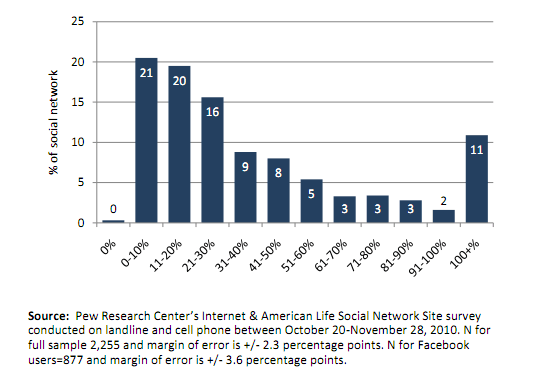
Contrary to what some people might think, using social media like Facebook, Twitter and LinkedIn actually correlates with being more social in the real world.
A just released report from the Pew Internet & American Life Project found that people who use use Facebook are more trusting than those who don’t and have closer personal relationships.
When asked whether they felt “that most people can be trusted,” Facebook users who use the site multiple times per day are “43% more likely than other internet users and more than three times as likely as non-internet users to feel that most people can be trusted.”
Perhaps more important, Facebook users have slightly more close confidents (2.16) than non-users (1.93). Confidents are defined as “people with whom they discuss important matters.”
The study also found that Facebook users are more likely to get emotional support from others and more likely to be politically engaged.
And, not surprisingly, Facebook users report that the service has helped them resurrect”dormant relationships.” The average user in the survey has 229 Facebook friends, broken down as follows:
- 22% people from high school
- 12% extended family
- 10% coworkers
- 9% college friends
- 8% immediate family
- 7% people from voluntary groups
- 2% neighbor
The report also found that, on an average day:
- 15% of Facebook users update their own status.
- 22% comment on another’s post or status
- 20% comment on another user’s photos.
- 26% “Like” another user’s content.
- 10% send another user a private message
Why?
The report didn’t indicate why Facebook and other social media users are slightly more social than non-users, but the results didn’t surprise me. We are long past the point where people who use online services are using them in lieu of personal relationships. Facebook, for both adults and kids, is increasingly becoming an extension or amplifier of real-world relationship While there are cases of people who use social media to reach out to strangers, most people use it to keep up with people they know in person or friends of friends. To the extent that people make new online friends they are often people with similar interests.
Methodology
Pew conducted telephone interviews with 2,255 American adults between October 20-November 28, 2010. That included 1,787 internet users and 975 users of social networking services such as Facebook, MySpace, LinkedIn, and Twitter. Surveyors say they have “95% confidence that the error attributable to sampling is plus or minus 2.5 percentage points.”
Disclosure: Larry Magid is co-director of ConnectSafely.org, a non-profit Internet safety organization that receives financial support from Facebook and other companies.
Be the first to comment